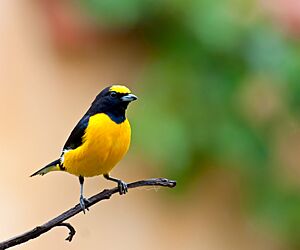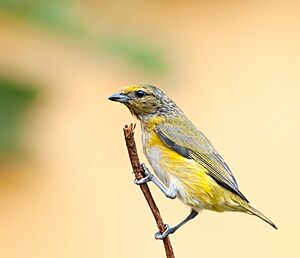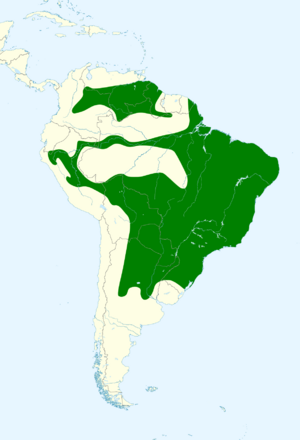Purple-throated euphonia facts for kids
The purple-throated euphonia (Euphonia chlorotica) is a small, colorful songbird. It belongs to the Fringillidae family, which includes finches. These birds are known for their bright feathers.
Quick facts for kids Purple-throated euphonia |
|
|---|---|
 |
|
| Male in Brazil | |
 |
|
| Female in Brazil | |
| Conservation status | |
| Scientific classification |
|
| Kingdom: | Animalia |
| Phylum: | Chordata |
| Class: | Aves |
| Order: | Passeriformes |
| Family: | Fringillidae |
| Subfamily: | Euphoniinae |
| Genus: | Euphonia |
| Species: |
E. chlorotica
|
| Binomial name | |
| Euphonia chlorotica (Linnaeus, 1766)
|
|
 |
|
| Script error: The function "autoWithCaption" does not exist. | |
| Synonyms | |
|
Tanagra chlorotica Linnaeus, 1766 |
|
Script error: No such module "Check for conflicting parameters".
Contents
Meet the Purple-Throated Euphonia
The purple-throated euphonia is a type of bird. It is part of the finch family. These birds are often found in warm, wet places. They like areas with lots of trees.
Where Do They Live?
You can find these birds in many countries in South America. They live in places like Argentina, Bolivia, and Brazil. They also live in Colombia, Ecuador, and French Guiana. Other homes include Guyana, Paraguay, Peru, Suriname, Uruguay, and Venezuela.
Their favorite places to live are moist lowland forests. They also live in areas where forests used to be. Even if the forest is changed, they can still make it their home.
What Do They Look Like?
Male purple-throated euphonias are very colorful. They have bright yellow bodies. Their throats are a deep purple color. Females are usually a bit duller. This helps them blend in with their surroundings.
How Did They Get Their Name?
Birds get their scientific names in a special way. In 1760, a French zoologist named Mathurin Jacques Brisson described this bird. He saw a bird from Cayenne, French Guiana.
Later, in 1766, a Swedish scientist named Carl Linnaeus gave it a scientific name. He called it Tanagra chlorotica. The name chlorotica comes from an old Greek word. It means "greenness." This might seem strange for a yellow bird!
Today, this bird is in the group called Euphonia. This group was named by a French zoologist named Anselme Gaëtan Desmarest in 1806. There are five slightly different types of this bird. These are called subspecies.
 | Stephanie Wilson |
 | Charles Bolden |
 | Ronald McNair |
 | Frederick D. Gregory |


